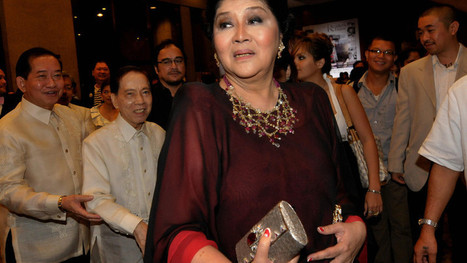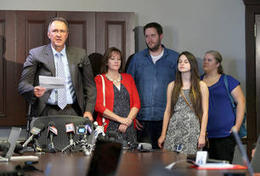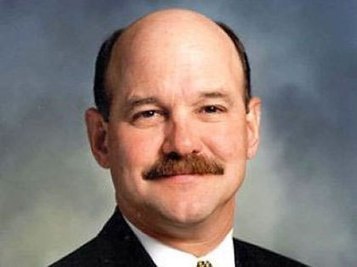The developing world lost US$946.7 billion in illicit outflows in 2011, an increase of 13.7% over 2010. The capital outflows stem from crime, corruption, tax evasion, and other illicit activity.
The report finds that from 2002 to 2011, developing countries lost US$5.9 trillion to illicit outflows. The outflows increased at an average rate of 10.2% per year over the decade—significantly outpacing GDP growth.
As a percentage of GDP, Sub-Saharan Africa suffered the biggest loss of illicit capital. Illicit outflows from the region averaged 5.7% of GDP annually. Globally, illicit financial outflows averaged 4% of GDP.
China leads the world over the 10-year period with US$1.08 trillion in illicit outflows. However, 2011 marked the first time that Russia’s illicit outflows exceeded China’s, with a loss of US$191.14 billion against China’s US$151.35 billion. The previous methodology had significantly understated Russia’s illicit outflows, while it overstated China’s illicit outflows.
Delete the scoop?
Are you sure you want to delete this scoop?
Yes No
Nevermore Sithole's curator
insight, December
13, 2013 6:40 AM
Global Financial Integrity - Reports
Sign up to comment
Corruption is a particularly viral form of cancer. It is
caught here and there but it reappears somewhere else as soon as vigilance is
relaxed. It is not eliminated, just driven underground. The corrupt merely
suspend their operations temporarily. It lingers, hovering always in the
background for its next opportunity.
- Gerald E. Caiden
- Gerald E. Caiden
Curated by Jim Wesberry
 Your
new post is loading... Your
new post is loading...
*** Key findings from PwC's 17th Annual Global Economic Crime Survey
*** Cyber crime: the Achilles heel of the business world *** Ukraine’s $19-billion question of debt and corruption *** FBI announces campaign to crack down on public corruption *** Ukraine’s $19-billion question of debt and corruption
Delete the scoop?
Are you sure you want to delete this scoop?
Yes No
No comment yet.
Former Utah Attorneys General John Swallow and Mark Shurtleff were arrested and charged Tuesday on allegations ranging from accepting bribes to destroying evidence.
Delete the scoop?
Are you sure you want to delete this scoop?
Yes No
No comment yet.
From www
The Justice Department, along with federal and state partners, today
announced a $7 billion settlement with Citigroup Inc. to resolve federal and
state civil claims related to Citigroup’s conduct in the packaging,
securitization, marketing, sale and issuance of residential mortgage-backed
securities (RMBS) prior to Jan. 1, 2009. The resolution includes a $4 billion
civil penalty – the largest penalty to date under the Financial Institutions
Reform, Recovery and Enforcement Act (FIRREA). As part of the settlement,
Citigroup acknowledged it made serious misrepresentations to the public –
including the investing public – about the mortgage loans it securitized in
RMBS. The resolution also requires Citigroup to provide relief to underwater
homeowners, distressed borrowers and affected communities through a variety of
means including financing affordable rental housing developments for low-income
families in high-cost areas. The settlement does not absolve Citigroup or its
employees from facing any possible criminal charges.
This settlement is part of the ongoing efforts of President Obama’s Financial Fraud Enforcement Task Force’s RMBS Working Group, which has recovered $20 billion to date for American consumers and investors. “This historic penalty is appropriate given the strength of the evidence of the wrongdoing committed by Citi,” said Attorney General Eric Holder. “The bank's activities contributed mightily to the financial crisis that devastated our economy in 2008. Taken together, we believe the size and scope of this resolution goes beyond what could be considered the mere cost of doing business. Citi is not the first financial institution to be held accountable by this Justice Department, and it will certainly not be the last.”
Delete the scoop?
Are you sure you want to delete this scoop?
Yes No
No comment yet.
Last week former New Orleans Mayor Ray Nagin became the latest American politician to be sent to jail for abuse of power, following in the footsteps of former Detroit Mayor Kwame Kilpatrick and onetime Illinois Congressman Jesse Jackson Jr. Despite such high-profile convictions, most Americans see political corruption as a problem that plagues the developing world far more than the U.S. The truth is more complex: It’s certainly the case that paying bribes is a lot less common in the U.S. than in Nigeria or Bolivia, for example. But when citizens are asked if corruption is prevalent in their country, they’re thinking about a lot more than bribes. They’re more concerned about whether government and the political system is fair or stacked against them. And on those grounds, there are good reasons to think the difference between the U.S. and developing countries isn’t very big at all.It doesn’t take a detailed look at Transparency International’s Corruption Perceptions Index to work out which types of countries are viewed to be particularly corrupt by the political risk analysts, aid agency economists, and think-tank staff whose opinions the index reflects... Nagin wasn’t convicted of taking a bribe. His big crimes were related to steering business to his family’s kitchen countertop company. That underscores a vital truth: There are lots of different ways to be corrupt. And when you survey people around the world about the problem of corruption in their country, most have a definition of “corruption” that’s broader than bribery. Ask the same people, “Have you paid a bribe,” and then ask, “Is corruption a problem in this country?” and the relationship between the two answers is weak. Again, ask the same companies, “How much do you pay in bribes?” and “Is corruption a major constraint to doing business,” and many who say bribery in their industry is common also don’t see corruption as a problem—while many who don’t pay bribes are convinced corruption is holding them back. People in
Delete the scoop?
Are you sure you want to delete this scoop?
Yes No
No comment yet.
From www
MANILA (Reuters) - Philippine President Benigno Aquino's performance ratings
have plunged to their lowest ever, two independent pollsters said on Monday, as
a perception grew that he is not serious enough...
"This is the largest decline in both approval and trust and it's also his lowest performance thus far," Ana Maria Tabunda, Pulse Asia research director, said in a television interview. People were disillusioned by widespread corruption in government, she said, adding that her poll was taken at the same time that the government arrested three senators on plunder charges for misuse of congressional funds and rising cost of rice and other food. Tabunda said the survey was largely complete by the time the Supreme Court rejected an Aquino creation of a discretionary fund, called the Disbursement Acceleration Program (DAB), which has become the administration's worst crisis in four years.
Delete the scoop?
Are you sure you want to delete this scoop?
Yes No
No comment yet.
Georgia doesn't rank among the most corrupt states in the nation, according
to a recent study. But it doesn't rank among the least corrupt either...
“I haven’t been able to access the full study, but I’m not sure this is the best methodology,” said Matthew Hipps, assistant professor of political science at Dalton State College. “I’m not sure that the number of convictions really tells us how much corruption there is in an area,” he added. “It’s a measure, but it’s not a very nuanced measure.”
Delete the scoop?
Are you sure you want to delete this scoop?
Yes No
No comment yet.
From www
A former chief executive of the country's biggest public pension fund
admitted that he took more than $250,000 in bribes and other valuable gifts from
a friend and co-defendant in an influence-peddling scandal that rocked the
pension investment world five years ago.
Federico R. Buenrostro Jr. pleaded guilty Friday to one federal charge of conspiracy to commit corruption and fraud in funneling deals through his friend, Alfred J.R. Villalobos, for outside firms to manage funds for the California Public Employees' Retirement System. We condemn the misconduct and ethical breaches admitted today by Mr. Buenrostro.- CalPERS' statement "It's a good day for justice, and was time for Mr. Buenrostro to admit his wrongdoing," said Philip Khinda, a Washington lawyer who led an 18-month internal investigation into a scandal that led to a slew of changes in CalPERS operations and state law. CalPERS, which manages about $300 billion in investments, said that it has taken "aggressive steps" to put into place new policies and reforms to ensure that its 1.6 million members — state and local government workers, retirees and their families — are not victims of future criminal fraud by insiders. "We condemn the misconduct and ethical breaches admitted today by Mr. Buenrostro," the fund said in an email. "CalPERS looks forward to justice being served in this case and for the individuals involved to be held accountable for their actions." Buenrostro, CalPERS' top official from 2002 until he was fired in 2008, said in his plea agreement that Villalobos personally delivered $200,000 in cash bribes in paper bags and shoe boxes, which were handed over at a Hyatt Hotel across from the state Capitol.
Delete the scoop?
Are you sure you want to delete this scoop?
Yes No
No comment yet.
From abcnews
As soccer fans flock to their televisions for the World Cup final this weekend, the FBI and international investigators are looking ahead to allegations of corruption and abuse halfway around the world in Qatar, where the 2022 games are scheduled to take place in one of the hottest places on earth -- where daytime temperatures regularly reach 124 degrees.
Delete the scoop?
Are you sure you want to delete this scoop?
Yes No
No comment yet.
From www
A construction union whistleblower has blasted an ‘‘independent’’
investigation into the allegations of corruption he raised.
The Construction, Forestry, Mining and Energy Union on Friday released its review into a string of allegations about misconduct by senior officials and links to crime figure George Alex. The claims were raised by whistleblowers who complained to CFMEU national secretary Michael O’Connor late in 2013. The allegations will be heard when the Heydon royal commission into union corruption sits in Sydney on Tuesday. The complaints spurred the union to ask its law firm, Slater & Gordon, to organise an investigation. It chose Sydney barrister Tony Slevin, whose report, released on Friday, exonerates the union’s leadership but suggests changes to the union’s rules dealing with whistleblowers and complaints.
Delete the scoop?
Are you sure you want to delete this scoop?
Yes No
No comment yet.
Thirty years on, public funding of Australian election campaigns has recorded a striking lack of success at stopping corruption. As should have been expected all along.
Delete the scoop?
Are you sure you want to delete this scoop?
Yes No
No comment yet.
It happens with disturbing regularity.
Delete the scoop?
Are you sure you want to delete this scoop?
Yes No
No comment yet.
Valdez accuses the health plans of “rampant fraud,” alleging they overcharged Medicare $300 million to $350 million a year from 2007 through 2010. He claims that Aveta Chief Executive Officer Richard Shinto fired him “in retaliation for his outspoken opposition to these illegal practices.” Valdez filed the lawsuit in Santa Ana, California, in April 2011, but it remained under court seal until February of this year. The case is pending.
Delete the scoop?
Are you sure you want to delete this scoop?
Yes No
No comment yet.
|
From fortune
A kickback scandal at America’s largest public pension included $200,000 of cash stuffed into shoeboxes and paper bags.
Delete the scoop?
Are you sure you want to delete this scoop?
Yes No
No comment yet.
Anticorruption advocates—including those in the private sector who have taken the fight against corruption seriously—insist that bribery is bad for business. That’s likely true in the aggregate, and perhaps it’s true for some individual firms. But it’s probably not true for all firms—otherwise, why would so many of them pay bribes? But it’s hard to know how much firms benefit from bribery. Likewise, while would be useful to know more about the factors that affect the size and probability of bribery, figuring this out is a challenge because of the secrecy of corrupt transactions.
Delete the scoop?
Are you sure you want to delete this scoop?
Yes No
No comment yet.
A Kenya Revenue Authority (KRA) audit has forced a number multinationals to
rewrite their financial statements, turning losses into profits in a review that
has yielded Sh25 billion in tax revenues...
Several multinationals had used the transfer pricing mechanism to declare losses, which effectively disqualified them from paying income tax.But a KRA audit of 40 conglomerates discovered widespread abuse of transfer pricing – which refers to prices charged when one unit of a multinational group buys or sells product from another part of the same group but in a different country.The culprits are expected to agree with KRA on a payment schedule that will enable them to clear the tax.
Delete the scoop?
Are you sure you want to delete this scoop?
Yes No
No comment yet.
Citigroup announced Monday that it will pay roughly $7 billion to settle a federal investigation into risky subprime mortgages, the type that helped bring on the financial crisis.The settlement stems from the sale of securities made up of subprime mortgages, which led to both the housing boom and bust that triggered the Great Recession at the end of 2007. Citigroup and other banks downplayed the risks of subprime mortgages when packaging and selling them to mutual funds, investment trusts, pensions, as well as other banks and investors. The securities, which contained so-called residential mortgage-backed securities and collateralized debt obligations, plunged in value when the housing market collapsed in 2006 and 2007. Those losses triggered a financial crisis that pushed the economy into the worst recession since the 1930s.
Delete the scoop?
Are you sure you want to delete this scoop?
Yes No
No comment yet.
Private universities are involved in transactions of "illegal money" at different stages -- from taking approvals for setting up a university to awarding certificates to students, says a study of Transparency International Bangladesh.
Delete the scoop?
Are you sure you want to delete this scoop?
Yes No
No comment yet.
The owner of a chain of medical imaging centers in North and Central Jersey has been charged with running a scheme that bilked N.J.'s Medicaid program of $8 million. Rehan Zuberi allegedly paid hundreds of thousands of dollars to doctors and chiropractors to refer patients for MRIs and other diagnostic services at imaging centers in Hackensack, Englewood, Wayne and other locations.
Delete the scoop?
Are you sure you want to delete this scoop?
Yes No
No comment yet.
In a way, Mr Putin's messianic Russian nationalism, Mr Erdogan's Islamism and Chinese leaders' exhortations of sacrifice take the edge off the sleaze. It is degrading to live in a venal polity, but the idea of a special national mission or destiny can be consoling. Lilia Shevtsova of the Carnegie Moscow Centre, a think-tank, says "Russians have been seduced to forget, temporarily, about Putin's corruption by the offer of compensation for their complexes and lost dreams"--in particular by the annexation of Crimea, a key part of Mr Putin's bid to restore Russian greatness.
Delete the scoop?
Are you sure you want to delete this scoop?
Yes No
No comment yet.
Russia’s government is not unique in combining lofty rhetoric with greasy
palms. Recep Tayyip Erdogan, Turkey’s prime minister, wants to restore the
country’s lost Ottoman grandeur and burnish public morality. He has restricted
the sale of alcohol and tried to ban adultery. Yet confronted with evidence of
ministers on the take, he purged the police and prosecutors instead of the
government: not an obviously moral response.
China’s Communist bosses rely on Maoist notions of ethical leadership and, implicitly, on a Confucian mandate supposedly bestowed by heaven for their righteousness. They pose as guarantors of order and stability—while their families amass Croesan wealth. A recent anti-corruption drive is snaring some big names without seriously disrupting the cash-flow. As Minxin Pei of Claremont McKenna College in California puts it, Chinese leaders manage to “move effortlessly between universes of extreme moralism and extreme corruption”. Every country has its charlatans and rogues, be they light-fingered British MPs or pork-happy American congressmen. Many, whether Latin American strongmen or African kleptocrats, claim to serve their people. Hardly any admit to thieving. But there is something especially grating about leaders who push moralistic causes, thus inviting judgment of their own behaviour, while overseeing scams. Casual observers may wonder why citizens put up with the hypocrisy—and how their rulers look at themselves in the mirror.
Delete the scoop?
Are you sure you want to delete this scoop?
Yes No
No comment yet.
From www
China’s central bank is investigating a report by state television that a major Chinese bank is helping clients transfer large amounts of money overseas in a program that violates currency controls, Xinhua, the state-run news agency, said Friday.
Delete the scoop?
Are you sure you want to delete this scoop?
Yes No
No comment yet.
Here comes a perhaps less-than-surprising conclusion from China’s Communist Party: When it comes to choosing and promoting its nearly 87 million members, it doesn’t do a very good job, the CCP’s organization department has admitted.
Delete the scoop?
Are you sure you want to delete this scoop?
Yes No
No comment yet.
From fcpamericas
OSD’s new report covers the first six fiscal years of its operation. It has
several key findings: In 95% of sanctions cases, OSD determined that there was
sufficient evidence to support at least one of the claims made by INT. It
rejected 5% of cases in their entirety. OSD referred 38% of cases back to INT
based on a determination that there was insufficient evidence to support one or
more of the accusations made. OSD found insufficient evidence on all claims
related to 13% of Respondents included in cases (some cases involve multiple
Respondents, which accounts for apparent discrepancies in the numbers above). On
average, OSD takes 60 days to make an evidentiary determination in a case. OSD
renders a new determination, on average, once every ten days. In 40% of cases,
Respondents appeal the case to the Sanctions Board. Settlements account for a
considerable percentage of cases – almost 30% in FY 2011, 22% in FY 2012, and
23% in FY 2013. While INT investigations require significant time to complete,
they have steadily grown shorter. In FY 2008 and 2009, they commonly lasted up
to three years, or longer. In FY 2011 and 2012, it was more common to see
investigations completed in less than two years. 86% of cases and settlements
received by OSD are based on fraud, 14% on corruption, and 9% on collusion (some
cases include more than one type of sanctionable practice). When considering the
types of fraud at issue in sanctions cases, there are about the same amount of
cases involving forged third party documents, like bank guarantees,
manufacturer’s certificates, and performance or experience documentation (105
cases), as there are of other forms of fraud, like false invoices or payment
certifications, misrepresentation or omission regarding a conflict or an agent,
or misrepresentation regarding past performance (99 cases). - See more at: http://fcpamericas.com/english/enforcement/data-world-bank-sanctions-office-suspension-debarment-releases-report/#sthash.ACzhiBnN.dpuf
Delete the scoop?
Are you sure you want to delete this scoop?
Yes No
No comment yet.
From www
Before Alan S. Mizen was accused of embezzling taxpayer money, his job was to sniff out embezzlers.
Delete the scoop?
Are you sure you want to delete this scoop?
Yes No
No comment yet.
|
http://www.scoop.it/t/corruption-1/p/4012541834/2013/12/11/global-financial-integrity-reports-illicit-financial-flows-from-developing-countries-2002-2011-overview |







